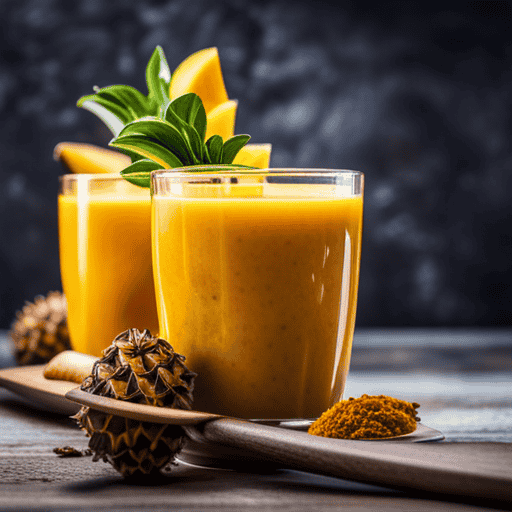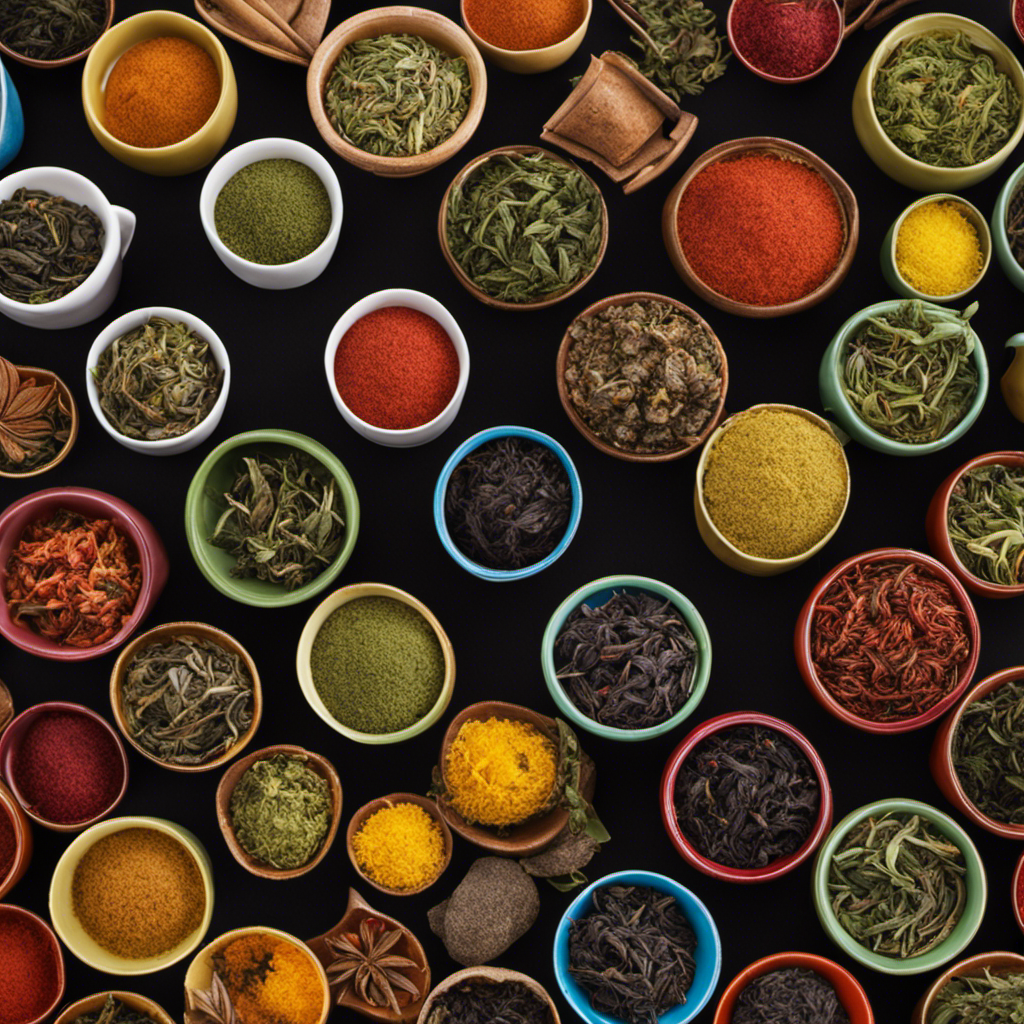Turmeric Tea
What Can I Mix With Turmeric To Make It Taste Better

Turmeric, the golden spice renowned for its numerous health benefits, has a distinct flavor that can be an acquired taste for some. But fear not! I’m here to reveal the secret to transforming turmeric from ordinary to extraordinary.
Prepare to be amazed as I unveil a variety of delectable combinations that will make your taste buds dance with delight. From aromatic spice blends to lip-smacking smoothies and savory dishes, there’s no shortage of ways to enhance the flavor of this vibrant spice.
Get ready to spice up your life as we explore the world of turmeric and discover how to make it taste better than ever before. So grab your apron and let’s embark on a culinary adventure that will leave you craving for more.
Trust me, these tantalizing turmeric creations will have you saying, ‘I never knew turmeric could taste this good!’
Key Takeaways
- Turmeric can be enhanced with different spice combinations like cumin, coriander, ginger, cinnamon, cardamom, and cloves.
- Turmeric blends well with herbs and spices like ginger, cinnamon, and peppermint in herbal teas.
- Turmeric can be incorporated into a wide range of dishes and beverages such as curries, rice dishes, smoothies, juices, salad dressings, pasta, roasted vegetables, cakes, cookies, ice cream, and cocktails.
- Adding olive oil to turmeric helps the body absorb the curcumin, the active compound in turmeric, making it more beneficial.
Explore Different Spice Combinations
If you’re looking to enhance the flavor of turmeric, why not experiment with various spice combinations to create a truly tantalizing and unique taste experience? Turmeric is a versatile spice that can be incorporated into a wide range of dishes and beverages.
To start, consider exploring regional spice combinations that are traditionally used with turmeric in various cuisines. For example, in Indian cuisine, turmeric is often paired with spices like cumin, coriander, and ginger to create flavorful curries and rice dishes. Similarly, in Middle Eastern cuisine, turmeric is commonly combined with spices like cinnamon, cardamom, and cloves to add a warm and aromatic touch to meat and vegetable dishes.
In addition to using turmeric in traditional dishes, you can also experiment with incorporating it into herbal teas. Turmeric blends well with a variety of herbs and spices, such as ginger, cinnamon, and peppermint. These combinations not only enhance the flavor of turmeric but also provide additional health benefits. Ginger, for example, is known for its anti-inflammatory properties, while cinnamon adds a hint of sweetness and warmth to the tea.
Transitioning into the next section about incorporating turmeric in smoothies and juices, you can also incorporate turmeric into your favorite beverages for a refreshing and nutritious twist. However, blending turmeric with other ingredients like fruits and vegetables can help balance out its strong flavor and create a harmonious taste. So, let’s explore the world of turmeric-infused smoothies and juices to further elevate your culinary adventures.
Incorporate Turmeric in Smoothies and Juices
Discover how to effortlessly enhance the flavor of your smoothies and juices by incorporating a secret ingredient that adds a vibrant twist to your favorite blends. Turmeric, with its warm and earthy flavor, is the perfect addition to give your drinks a healthy boost.
Not only does it provide a beautiful golden hue, but it also offers numerous health benefits. To incorporate turmeric into your smoothies and juices, consider making turmeric-infused herbal teas. Simply brew a cup of your favorite herbal tea and add a teaspoon of turmeric powder for a subtle yet flavorful twist.
You can also experiment with turmeric-spiced salad dressings by mixing turmeric powder with olive oil, lemon juice, honey, and your choice of herbs and spices. The result is a tangy and aromatic dressing that’ll take your salads to the next level.
By adding turmeric to your smoothies, juices, and dressings, you can enjoy its unique flavor while reaping its health benefits.
Next, let’s explore how to use turmeric in savory dishes…
Use Turmeric in Savory Dishes
Transform your savory dishes into culinary masterpieces by infusing them with the warm and earthy essence of turmeric, adding a burst of flavor that’ll transport your taste buds to new heights.
Turmeric can be a versatile spice in savory dishes, bringing a vibrant yellow hue and a subtle bitterness to your creations. One way to incorporate turmeric is by using it in pasta dishes. Simply add a pinch of turmeric to your pasta dough or sprinkle it on top of cooked pasta to infuse it with its distinct flavor.
You can also experiment with turmeric-spiced roasted vegetables, such as cauliflower or potatoes. Toss them in a mixture of olive oil, turmeric, salt, and pepper, then roast them in the oven for a delicious and nutritious side dish.
By incorporating turmeric into your savory dishes, you not only enhance their taste but also reap the potential health benefits of this powerful spice. Turmeric is known for its anti-inflammatory and antioxidant properties, making it a valuable addition to your meals.
So why stop at savory dishes? Try turmeric in sweet treats and discover a whole new world of flavors.
Try Turmeric in Sweet Treats
Indulge in the rich and decadent world of sweet treats by incorporating the warm and earthy essence of turmeric, elevating your desserts to a whole new level of complexity and depth. Turmeric isn’t just limited to savory dishes; it can also be a delightful addition to your favorite sweet indulgences.
When it comes to incorporating turmeric in desserts, the possibilities are endless. You can add a teaspoon of turmeric powder to your favorite cake or cookie recipes to infuse them with a subtle spiciness and vibrant color. Turmeric pairs exceptionally well with ingredients like cinnamon, ginger, and vanilla, creating a harmonious blend of flavors.
One unique way to enjoy turmeric in sweet treats is by making turmeric ice cream. The warm and earthy flavor of turmeric adds a delightful twist to the creamy and indulgent dessert. Simply mix turmeric powder with your favorite ice cream base and freeze it until it reaches the perfect consistency. The result is a refreshing treat that not only satisfies your sweet tooth but also offers the numerous health benefits of turmeric.
As you explore the world of turmeric-infused desserts, remember to experiment with turmeric drinks as well. But before we dive into that, let’s discover some exciting ways to incorporate turmeric into your favorite beverages.
Experiment with Turmeric Drinks
Let’s start exploring the exciting realm of turmeric-infused beverages and get ready for a refreshing and flavorful journey. Turmeric drinks are a fantastic way to incorporate this vibrant spice into your daily routine while enjoying its health benefits. Whether you’re looking for a warm and cozy beverage or a refreshing cocktail, there are plenty of options to suit your taste buds.
One popular turmeric drink is the turmeric latte, also known as golden milk. This creamy and comforting drink combines turmeric with milk (or plant-based milk) and a touch of sweetness. You can customize your latte by adding other spices like cinnamon or ginger for an extra kick of flavor.
If you’re in the mood for something more adventurous, why not try turmeric-infused cocktails? Turmeric pairs well with citrus flavors, making it a great addition to margaritas or mimosas. You can also experiment with turmeric in your favorite mixed drinks by adding a pinch of turmeric powder or a turmeric-infused simple syrup.
Incorporating turmeric into your drinks not only adds a unique flavor but also provides you with the health benefits of this powerful spice. Turmeric is known for its anti-inflammatory and antioxidant properties, making it a great addition to your daily routine.
Now, let’s move on to the next section and discover how to pair turmeric with healthy fats for an even more nourishing experience.
Pair Turmeric with Healthy Fats
Enhance your turmeric experience by combining it with nourishing healthy fats for a truly satisfying and wholesome treat. One great way to pair turmeric with healthy fats is by using avocados. Avocados are not only creamy and delicious, but they’re also packed with monounsaturated fats, which are known to be heart-healthy.
You can make a turmeric avocado smoothie by blending ripe avocados with turmeric powder, a splash of coconut milk, and a sweetener of your choice. This smoothie isn’t just a great way to incorporate turmeric into your diet, but it also provides you with a good dose of healthy fats to keep you feeling full and satisfied.
Another way to incorporate turmeric and healthy fats is by using turmeric in salad dressings. Simply whisk together olive oil, lemon juice, turmeric powder, and a pinch of salt and pepper to create a flavorful dressing. The healthy fats from the olive oil will help your body absorb the curcumin in turmeric, which is the compound responsible for its many health benefits. This dressing can be drizzled over a fresh green salad or used as a marinade for grilled vegetables.
Incorporating turmeric into your diet doesn’t have to be limited to drinks and dressings. Stay tuned for the next section where I’ll share how you can incorporate turmeric in baked goods for a delicious and nutritious twist.
Incorporate Turmeric in Baked Goods
Discover the delightful world of turmeric-infused baked goods, where warm and aromatic spices blend together to create mouthwatering treats that’ll leave you craving for more.
Turmeric, with its earthy and slightly bitter flavor, adds a unique twist to pastries and breads, bringing both taste and health benefits to your kitchen.
When incorporating turmeric into your baked goods, there are endless possibilities to explore. Here are some ideas to get you started:
-
Turmeric Infused Pastries: Add a pinch of turmeric to your favorite pastry recipes, such as muffins, scones, or cookies. The vibrant yellow color of turmeric won’t only make your pastries visually appealing but also infuse them with a warm and slightly spicy flavor.
-
Turmeric Spiced Breads: Give your bread a twist by incorporating turmeric into the dough. Whether you’re making a classic sandwich loaf or experimenting with flavored breads like naan or focaccia, turmeric will add a subtle complexity that pairs well with various ingredients.
-
Golden Milk Cakes: Turmeric is a key ingredient in the golden milk beverage, known for its anti-inflammatory properties. Incorporating turmeric into a cake recipe creates a moist and flavorful dessert that combines the benefits of turmeric with the sweetness of cake.
With these ideas, you can easily incorporate turmeric into your baked goods, elevating their taste and adding a healthy touch. So, go ahead and experiment with turmeric-infused pastries and turmeric spiced breads, and indulge in the delightful flavors they bring to your table.
Frequently Asked Questions
Can turmeric be mixed with dairy products like milk or yogurt to enhance its taste?
Yes, turmeric can be mixed with dairy products like milk or yogurt to enhance its taste. Other dairy products that can be mixed with turmeric include cream, cheese, and butter. Alternatively, you can mix turmeric with ingredients like honey, lemon juice, or coconut milk for a more flavorful result.
Are there any specific fruits that pair well with turmeric in smoothies and juices?
Turmeric pairs well with fruits like pineapple, mango, and banana in smoothies for post-workout recovery. For refreshing summer juices, try combining turmeric with citrus fruits like oranges or lemons for a zesty flavor boost.
Can turmeric be used in both vegetarian and non-vegetarian savory dishes?
Yes, turmeric can be used in both vegan recipes and meat dishes. It adds a warm and earthy flavor to vegetarian dishes like curries and roasted vegetables. In meat dishes, it can be used as a spice rub or seasoning for added depth of flavor.
How can turmeric be incorporated into desserts without overpowering the sweetness?
Incorporating turmeric into desserts can be a delicious adventure! Try indulging in turmeric-infused ice cream recipes or experimenting with turmeric spiced cake ideas for a delightful twist on traditional treats. Get ready to satisfy your sweet tooth with a hint of golden goodness!
What are some popular turmeric drink recipes that can be easily made at home?
There are several health benefits of turmeric in drink recipes. One popular option is turmeric latte, which can be made with variations like adding ginger, cinnamon, or honey for added flavor and health benefits.
Conclusion
In conclusion, adding a touch of turmeric to your meals can transform them into tantalizing treats. By exploring different spice combinations and incorporating turmeric into smoothies, savory dishes, and sweet treats, you can elevate the taste and health benefits of your culinary creations.
Don’t forget to experiment with turmeric drinks and pair it with healthy fats for a truly delightful and nutritious experience. So, seize the opportunity to savor the sensational flavors of turmeric and spice up your meals with this golden gem of a spice!
Justin is a seasoned author, coffee and tea enthusiast, and an essential member of the Cappuccino Oracle team. With a keen appreciation for the complexities of coffee, coffee alternatives, and tea, Justin has dedicated his professional career to exploring these realms and sharing his insights with readers worldwide.
Justin’s immersion in the world of coffee, coffee alternatives, and tea began at a young age, kindling a passion that extended beyond mere consumption. This love for these beverages led him to combine his talent for writing with his devotion to coffee and tea, bringing him to Cappuccino Oracle as a dedicated author.
Turmeric Tea
What Does Kombucha Tea Do to Your Body

Curious about the effects of kombucha tea on your body? Allow me to shed some light on the topic.
This ancient fermented drink has gained popularity in recent years for its potential health benefits. From improving digestion and gut health to boosting the immune system and aiding in detoxification, kombucha tea offers a range of positive effects.
However, it’s important to be aware of potential side effects and take necessary precautions.
So, let’s dive in and explore the wonders of kombucha tea!
Key Takeaways
- Kombucha tea promotes healthy digestion and gut health by aiding in nutrient absorption, breaking down food, and restoring beneficial bacteria in the gut.
- It supports the immune system through the presence of beneficial bacteria, probiotics, antioxidants, polyphenols, and vitamins and minerals.
- Kombucha tea has detoxification properties that help neutralize free radicals, eliminate toxins, improve liver function, and promote a healthy gut microbiome.
- It is important to be aware of potential side effects and precautions, such as possible allergic reactions, contamination risks, and starting with small amounts to minimize side effects. It is also advisable to consult with a healthcare provider if you have a weakened immune system or underlying health conditions.
Health Benefits of Kombucha Tea
You’ll be pleased to know that drinking kombucha tea can provide you with numerous health benefits.
One of the most notable benefits is its potential for weight loss. Kombucha tea is low in calories and can help to suppress appetite, making it a great addition to a weight loss regimen. Additionally, kombucha tea contains acetic acid, which has been found to increase metabolism and fat burning. It also aids in digestion, promoting a healthy gut, which is essential for maintaining a healthy weight.
Another benefit of kombucha tea is its impact on skin health. The tea is rich in antioxidants, which help to protect the skin from damage caused by free radicals. It also contains probiotics, which can improve skin conditions such as acne and eczema.
Effect on Digestion and Gut Health
The fermentation in kombucha can promote healthier digestion and gut health. Kombucha is rich in digestive enzymes, which help break down food and enhance nutrient absorption. Additionally, it contains probiotic bacteria that can restore the balance of beneficial bacteria in the gut, supporting a healthy digestive system.
Kombucha can alleviate digestive issues such as bloating and gas, providing relief and improving overall comfort. The probiotics in kombucha can strengthen the intestinal barrier, reducing the risk of leaky gut syndrome and enhancing gut health. By promoting the growth of beneficial bacteria in the gut, kombucha can support a healthy microbiome and improve digestion.
These effects on digestion and gut health are crucial for maintaining overall wellness. Furthermore, the impact of kombucha on the immune system is worth exploring.
Impact on Immune System
Boosting your immune system is essential for maintaining overall health and well-being. One way to strengthen your defenses is by incorporating kombucha tea into your diet. Kombucha is a fermented tea that contains beneficial bacteria and antioxidants, which can support your immune system. Studies have shown that the probiotics found in kombucha can help improve gut health and enhance the body’s ability to fight off infections. Additionally, the antioxidants in kombucha can help reduce inflammation and oxidative stress, further supporting immune function. To emphasize the benefits of kombucha for immunity, here is a table showcasing some key components and their effects:
| Component | Effect on Immune System |
|---|---|
| Probiotics | Enhances immune response |
| Antioxidants | Reduces inflammation |
| Polyphenols | Boosts immune function |
| Vitamins and Minerals | Supports overall health |
Incorporating kombucha tea into your daily routine can be a simple and delicious way to boost your immunity and strengthen your body’s defenses.
Detoxification Properties of Kombucha Tea
Incorporating kombucha into your routine can help detoxify and cleanse your system. This fermented tea contains beneficial compounds that support the detoxification process and promote liver health. Here are three reasons why kombucha is a great addition to your detox regimen:
-
Kombucha contains antioxidants that help neutralize harmful free radicals in the body, reducing oxidative stress and supporting the natural detoxification process.
-
The organic acids present in kombucha, such as acetic acid and glucuronic acid, aid in the elimination of toxins and improve liver function.
-
Kombucha is rich in probiotics, which promote a healthy gut microbiome. A balanced gut microbiome is crucial for optimal detoxification and overall well-being.
By incorporating kombucha into your routine, you can enhance your body’s natural detoxification process and promote liver health.
However, it is important to be aware of potential side effects and take necessary precautions.
Potential Side Effects and Precautions
While kombucha can offer numerous health benefits, it’s important to be aware of potential side effects and take necessary precautions.
Although considered generally safe for most people, there are potential risks associated with consuming kombucha tea. One of the main concerns is the possibility of allergic reactions. Some individuals may be sensitive to certain components in kombucha, such as yeast or bacteria, and may experience symptoms like hives, itching, or difficulty breathing.
It’s also worth noting that homemade kombucha may carry a higher risk of contamination, leading to adverse effects. To minimize the chances of experiencing side effects, it is recommended to start with small amounts of kombucha and gradually increase the intake.
Additionally, individuals with weakened immune systems or underlying health conditions should consult with their healthcare provider before consuming kombucha.
Frequently Asked Questions
Can Kombucha Tea Help With Weight Loss?
I’ve found that kombucha tea can be helpful for weight loss. It can boost metabolism and aid in appetite control. However, it’s important to note that it should be consumed as part of a balanced diet and exercise routine.
How Often Should I Drink Kombucha Tea to Experience Its Health Benefits?
To experience the health benefits of kombucha tea, I drink it regularly. It’s important to find a balance and not overdo it. I’ve found that drinking it a few times a week works well for me.
Can Kombucha Tea Cure or Prevent Cancer?
Can kombucha tea really cure or prevent cancer? While there are no scientific studies to support this claim, kombucha tea has been known to support the immune system and improve digestive health.
Is It Safe to Consume Kombucha Tea During Pregnancy?
During pregnancy, it is important to consider the potential risks and side effects of consuming kombucha tea. It is best to consult with a healthcare professional to determine if it is safe for breastfeeding mothers.
Does Kombucha Tea Have Any Effect on Mental Health or Anxiety?
Kombucha tea can have a positive effect on mood and help reduce stress. It contains B vitamins and probiotics, which support a healthy gut-brain connection. Regular consumption may contribute to improved mental well-being.
Conclusion
In conclusion, it’s safe to say that indulging in a glass of kombucha tea every now and then can work wonders for your body.
From promoting healthy digestion and gut health to boosting your immune system, this fizzy elixir is a true gem.
Not to mention its detoxifying properties, which gently cleanse your body from within.
However, as with anything, it’s important to exercise caution and moderation.
So go ahead and enjoy the delightful benefits of kombucha tea, but remember to sip responsibly.
Noah, the Editor-in-Chief at Cappuccino Oracle, plays a pivotal role in shaping the voice and vision of our renowned platform. With an unwavering passion for coffee, coffee alternatives, and tea, Noah leads Cappuccino Oracle towards new horizons in the realm of coffee journalism.
Beyond his professional responsibilities, Noah serves as a mentor and guiding force for his team. His dedication to journalistic excellence and genuine love for coffee, coffee alternatives, and tea continue to inspire and motivate the Cappuccino Oracle family. In the ever-evolving world of these beverages, Noah’s leadership ensures that our platform remains at the forefront, delivering enlightening and enjoyable content to our readers worldwide.
Turmeric Tea
Where Did Kombucha Scoby Tea Originate

I have always been fascinated by the origins of kombucha scoby tea. As I explored its history, I unearthed a captivating journey that has unfolded over centuries and across continents.
This ancient drink, known for its probiotic properties and unique flavor, has a rich cultural significance and a deep-rooted tradition.
In this article, we will explore the historical significance, cultural roots, and traditional brewing methods of kombucha scoby tea.
So, let’s dive in and uncover the truth behind where this beloved beverage truly originated.
Key Takeaways
- Kombucha scoby tea originated in China over 2,000 years ago during the Qin Dynasty.
- It was consumed for its medicinal properties and believed to have detoxifying effects and digestive benefits.
- Kombucha has been part of different cultures’ traditions for thousands of years.
- Brewing and consuming kombucha has brought communities together and fostered a sense of connection.
The Ancient Origins of Kombucha Scoby Tea
You might be curious to know that the ancient origins of kombucha scoby tea can be traced back to China over 2,000 years ago. Kombucha, also known as ‘the tea of immortality,’ has a rich history and a reputation for its health benefits.
The origins of kombucha can be attributed to the Qin Dynasty, where it was consumed for its medicinal properties. Traditional Chinese medicine believed that kombucha had detoxifying effects and could improve digestion and overall well-being.
The unique fermentation process used to create kombucha involves a symbiotic culture of bacteria and yeast (SCOBY), which creates a fizzy, tangy, and slightly sweet beverage. This ancient elixir has been passed down through generations, transcending time and cultures, and continues to be enjoyed today for its various health benefits.
Now, let’s delve into the historical significance of kombucha scoby tea.
Historical Significance of Kombucha Scoby Tea
The historical significance of this fermented drink can be traced back to its ancient origins. Kombucha scoby tea has a rich history that spans centuries and cultures. Here are three reasons why this drink holds such importance:
-
Tradition: Kombucha has been consumed for thousands of years, with its origins believed to be in China or Russia. It has been passed down through generations, becoming a beloved part of different cultures’ traditions.
-
Health Benefits: Kombucha is known for its potential health benefits. It is rich in probiotics, which can promote gut health and digestion. It also contains antioxidants, which can help protect against oxidative stress and inflammation.
-
Community: Kombucha brewing has brought communities together for centuries. It has been shared among friends and family, fostering a sense of connection and camaraderie.
Understanding the historical origins and health benefits of kombucha scoby tea allows us to appreciate its significance in our lives today.
Cultural Roots of Kombucha Scoby Tea
Believed to have its roots in China or Russia, kombucha scoby tea has been a part of different cultures’ traditions for thousands of years. This ancient beverage has been influenced by various cultural practices, each adding their unique twist to the brewing process.
In China, kombucha is known as ‘chájūn’ and is believed to have been consumed for its health benefits. In Russia, it is called ‘chaynyy grib’ and is often associated with folklore and traditional medicine. These cultural influences have shaped the way kombucha is brewed and consumed today.
Kombucha scoby tea is celebrated for its numerous health benefits, including probiotics, antioxidants, and detoxification properties. It is believed to support digestion, boost the immune system, and improve overall gut health.
With its rich cultural heritage and health-promoting properties, kombucha scoby tea continues to be enjoyed by people worldwide.
Kombucha Scoby Tea’s Journey Across Continents
Traveling across continents, kombucha scoby tea found its way into different cultures and was embraced for its unique flavors and health benefits. People from all walks of life have come to appreciate the numerous benefits that this fermented tea offers. Here are three reasons why kombucha scoby tea has gained such popularity today:
Improved Digestion: Kombucha scoby tea contains probiotics, which promote a healthy gut by improving digestion and aiding in nutrient absorption. This can lead to reduced bloating, increased energy levels, and a strengthened immune system.
Detoxification: The tea is rich in antioxidants that help eliminate toxins from the body, supporting liver health and boosting overall detoxification processes.
Mental Well-being: Kombucha scoby tea is known to have a positive impact on mental health. Its B vitamins and amino acids can help reduce stress, improve mood, and enhance cognitive function.
Given its wide range of health benefits, it’s no wonder that kombucha scoby tea has become a popular beverage choice today. Transitioning into the next section, let’s explore the traditional brewing methods of this remarkable tea.
Traditional Brewing Methods of Kombucha Scoby Tea
To brew kombucha scoby tea traditionally, you’ll need a few basic ingredients like black or green tea, sugar, and a scoby. The traditional methods of brewing kombucha scoby tea involve a fermentation process that has been passed down for generations.
First, I start by boiling water and steeping the tea leaves for about 10 minutes. Then, I add sugar to the hot tea and stir until it dissolves completely. After the tea has cooled to room temperature, I transfer it to a glass jar and place the scoby on top. The scoby acts as a culture that will feed on the sugar and convert the tea into a tangy and fizzy beverage.
I cover the jar with a cloth and let it sit undisturbed for about a week, allowing the fermentation process to take place. During this time, the scoby consumes the sugar, producing carbon dioxide and various acids that give kombucha its unique taste.
Once the desired flavor is achieved, I strain the tea and store it in the refrigerator for a refreshing and healthy drink.
Frequently Asked Questions
What Are the Health Benefits of Drinking Kombucha Scoby Tea?
Drinking kombucha scoby tea has numerous health benefits. It boosts digestion, strengthens the immune system, detoxifies the body, and improves gut health. The brewing process involves fermenting sweet tea with a scoby, resulting in a probiotic-rich beverage.
What Are the Different Flavors of Kombucha Scoby Tea Available?
There are many flavored variations of kombucha scoby tea available, each with its own unique taste. Brewing techniques can vary, but the common goal is to ferment the tea with a symbiotic culture of bacteria and yeast (SCOBY) to create a tangy and fizzy beverage.
How Long Does It Take to Brew Kombucha Scoby Tea?
Brewing time for kombucha scoby tea varies, but it usually takes around 7-14 days. Temperature control is important during fermentation to ensure proper growth of the scoby and the desired flavor profile.
Can Kombucha Scoby Tea Be Made at Home?
Sure, you can make kombucha scoby tea at home. It’s easy and has many benefits. You’ll need a scoby, tea, sugar, and patience. Homemade kombucha scoby tea is delicious, probiotic-rich, and a great way to support gut health.
Is Kombucha Scoby Tea Suitable for People With Dietary Restrictions, Such as Vegans or Those With Gluten Intolerance?
Yes, kombucha scoby tea is suitable for people with dietary restrictions. There are vegan alternatives available and it is naturally gluten-free. It’s a great option for those looking for a healthy and flavorful beverage.
Conclusion
In conclusion, learning about the ancient origins and cultural significance of Kombucha Scoby Tea has been truly fascinating. It is incredible to think that this elixir has traveled across continents, leaving its mark on various cultures throughout history.
Just like the Scoby itself, Kombucha has a way of connecting people, bridging gaps, and fostering a sense of community. It is a reminder that even in a diverse world, we can find common ground and create something beautiful together.
So, let’s raise a glass of this delightful beverage and toast to the power of unity and the magic of Kombucha Scoby Tea. Cheers!
Justin is a seasoned author, coffee and tea enthusiast, and an essential member of the Cappuccino Oracle team. With a keen appreciation for the complexities of coffee, coffee alternatives, and tea, Justin has dedicated his professional career to exploring these realms and sharing his insights with readers worldwide.
Justin’s immersion in the world of coffee, coffee alternatives, and tea began at a young age, kindling a passion that extended beyond mere consumption. This love for these beverages led him to combine his talent for writing with his devotion to coffee and tea, bringing him to Cappuccino Oracle as a dedicated author.
Turmeric Tea
Which Tea for Kombucha

So you’re interested in making kombucha, huh? Well, you’re in luck! In this article, I will discuss the top teas to use for brewing this delicious fermented drink.
From the benefits of green tea to the unique choices of oolong and white tea, we’ll explore it all.
So sit back, grab a cuppa, and let’s dive into the wonderful world of kombucha brewing. Trust me, you won’t want to miss this!
Key Takeaways
- Green tea is rich in antioxidants and contains catechins with antimicrobial properties, making it a beneficial choice for kombucha.
- Black tea, with its higher caffeine content, stimulates the SCOBY and results in tangy and slightly effervescent kombucha.
- Herbal teas offer unique flavors and aromas, aid digestion, boost immunity, and promote overall well-being when used in kombucha.
- Oolong and white teas add complex flavors, with oolong tea providing weight loss promotion and improved heart health, while white tea boosts the immune system and promotes healthy skin.
Benefits of Green Tea for Kombucha
Green tea is known for its numerous health benefits, making it a popular choice for making kombucha. When it comes to kombucha, green tea offers a range of advantages that make it an ideal base for fermentation.
Firstly, green tea is rich in antioxidants, which help to protect the body against free radicals and reduce the risk of chronic diseases. Additionally, green tea contains compounds like catechins, which have antimicrobial properties that can support the growth of beneficial bacteria during the fermentation process.
When choosing the best green tea brand for kombucha, it is important to look for high-quality loose leaf tea that is organic and free from additives. This ensures that you are getting the maximum health benefits and flavor for your kombucha.
Now, let’s explore the different black tea varieties that can also be used for brewing kombucha.
Exploring Black Tea Varieties for Kombucha
You’ll find that Assam and Ceylon are two popular black tea varieties for making kombucha. These teas provide a robust flavor profile that complements the fermentation process.
When exploring different fermentation methods for kombucha, it’s important to consider the role of caffeine. Black tea contains a higher caffeine content compared to other tea varieties, which can influence the fermentation process. The caffeine acts as a stimulant for the SCOBY (symbiotic culture of bacteria and yeast), helping it to metabolize sugars and produce organic acids. This results in a tangy and slightly effervescent kombucha. Additionally, the caffeine in black tea can provide a natural energy boost when consumed.
Transitioning into the subsequent section about herbal tea options for kombucha brewing, let’s now explore the caffeine-free alternatives for those looking to enjoy kombucha without the stimulating effects of caffeine.
Herbal Tea Options for Kombucha Brewing
When brewing kombucha, it’s worth considering the variety of caffeine-free herbal teas available as an alternative to black tea. Not only do herbal teas offer unique flavors and aromas, but they also bring a range of health benefits to your homemade kombucha.
Herbal teas are known for their calming properties, aiding digestion, boosting immunity, and promoting overall well-being. Some of the best herbal tea blends for kombucha include chamomile, which adds a soothing floral note, and hibiscus, which lends a vibrant and tangy flavor. Other popular options are peppermint, with its refreshing taste, and lavender, which adds a delicate floral touch.
These herbal teas can elevate your kombucha experience and provide a delightful twist to your brew.
Now, let’s explore another unique choice for kombucha: oolong tea.
Oolong Tea: A Unique Choice for Kombucha
Oolong tea has a distinct flavor profile that adds a unique twist to your homemade kombucha. It is a semi-oxidized tea that falls between green and black tea in terms of oxidation level. This results in a complex flavor that is both floral and fruity, with a hint of earthiness.
Oolong tea benefits include promoting weight loss, boosting metabolism, and improving heart health. Its rich flavor profiles make it a versatile choice for kombucha brewing. Here are three reasons why you should consider using oolong tea for your kombucha:
- Oolong tea adds a depth of flavor that enhances the overall taste of your kombucha.
- Its floral and fruity notes create a refreshing and aromatic brew.
- The unique combination of antioxidants in oolong tea promotes general well-being and adds health benefits to your fermented drink.
Incorporating oolong tea into your kombucha recipe will not only make it more interesting but also provide you with the benefits of this unique and flavorful tea.
White Tea: An Unexpected Twist for Kombucha
White tea adds a delicate and subtle flavor profile that brings a surprising twist to your homemade kombucha. Not only does it enhance the taste, but white tea also offers numerous health benefits.
Known for its high antioxidant content, white tea helps boost your immune system and fight off free radicals. It is also believed to promote healthy skin and support weight loss.
When choosing white tea for your kombucha, it is important to opt for high-quality brands that prioritize organic and sustainable farming practices. Some of the best white tea brands include Silver Needle, White Peony, and Longevity Eyebrow. These brands ensure that you are getting the finest leaves that will infuse your kombucha with a delightful flavor and maximize the health benefits.
Frequently Asked Questions
How Long Does It Take for Kombucha to Ferment Using Different Types of Tea?
It depends on the type of tea used for kombucha fermentation. Some tea varieties, like black tea, ferment faster, taking around 7-10 days. Green tea and white tea may take longer, around 10-14 days.
Can I Use Flavored Teas to Make Kombucha?
Yes, you can use flavored teas to make kombucha. However, it’s best to stick with traditional teas like green tea for kombucha brewing. Herbal teas may not provide the necessary nutrients for fermentation.
What Factors Should I Consider When Choosing the Right Tea for Kombucha?
When choosing tea for kombucha, factors to consider are the type of tea (green, black, or oolong), caffeine content, and flavor profile. Different types of tea may require varying fermentation times.
Are There Any Teas That Should Be Avoided When Making Kombucha?
There are some teas that should be avoided when making kombucha. They can impact the fermentation time and affect the taste. It’s important to choose the right tea to ensure a successful brew.
Can I Blend Different Types of Tea Together to Make Kombucha?
Yes, you can blend different types of tea together to make kombucha. It’s a great way to experiment with flavors and create unique taste profiles. Just make sure to choose teas that are suitable for kombucha fermentation.
Conclusion
In conclusion, choosing the right tea for your kombucha is crucial in achieving the perfect balance of flavors and health benefits.
Green tea offers a refreshing and antioxidant-rich base, while black tea varieties add depth and complexity.
Herbal teas provide a wide range of flavors and can be a great option for those looking to experiment.
Oolong tea brings a unique twist with its semi-fermented leaves, and white tea provides a surprising touch of delicacy.
Remember, the choice of tea is like the key ingredient in a symphony, harmonizing all the flavors together.
So, grab your kettle and start brewing your own kombucha masterpiece!
Justin is a seasoned author, coffee and tea enthusiast, and an essential member of the Cappuccino Oracle team. With a keen appreciation for the complexities of coffee, coffee alternatives, and tea, Justin has dedicated his professional career to exploring these realms and sharing his insights with readers worldwide.
Justin’s immersion in the world of coffee, coffee alternatives, and tea began at a young age, kindling a passion that extended beyond mere consumption. This love for these beverages led him to combine his talent for writing with his devotion to coffee and tea, bringing him to Cappuccino Oracle as a dedicated author.
-

 Coffee Alternatives And Tea3 weeks ago
Coffee Alternatives And Tea3 weeks agoThe Coffee Alternative That’s Helping People Live to 100
-

 Coffee, Tea and Alternatives and Health plus Fitness1 week ago
Coffee, Tea and Alternatives and Health plus Fitness1 week agoThe Shocking Reason Health Experts Are Abandoning Green Tea
-

 Coffee Alternatives And Tea1 week ago
Coffee Alternatives And Tea1 week agoNutritionists Are Raving About This Coffee Alternative – Here’s Why
-

 Coffee Alternatives And Tea1 week ago
Coffee Alternatives And Tea1 week agoThe ‘Miracle Tea’ That’s Helping People Sleep Better Than Ever
-

 Coffee Alternatives And Tea1 week ago
Coffee Alternatives And Tea1 week agoThis Coffee Substitute Promises to Double Your Productivity
-

 Coffee Alternatives And Tea7 days ago
Coffee Alternatives And Tea7 days agoThe Tea That’s So Good, It’s Causing Shortages Worldwide
-

 Coffee Basics2 weeks ago
Coffee Basics2 weeks agoCoffee and Longevity: Exploring the Link Between Coffee and Lifespan
-

 Coffee Alternatives And Tea2 weeks ago
Coffee Alternatives And Tea2 weeks agoThe Tea That Promises to Boost Your Metabolism by 500%




























